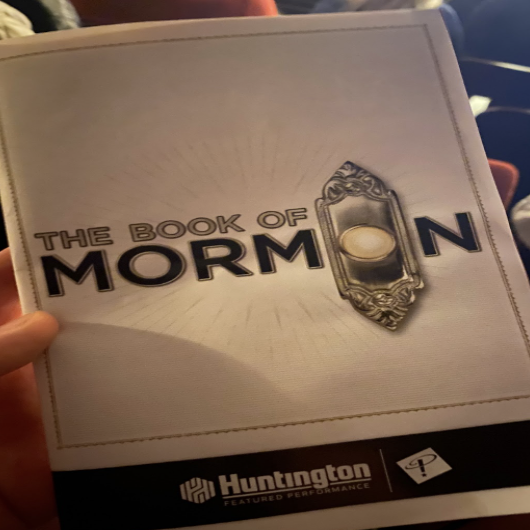From Oct. 24-29, “The Book of Mormon”, winner of nine Tony Awards and written by the creators of “South Park,” took centerstage at KeyBank State Theatre in Playhouse Square as a part of the show’s non-equity tour in the United States.
The plot of the musical is rather simple: two missionaries from The Church of Jesus Christ of Latter-Day Saints (most commonly known as Mormonism), Elder Price and Elder Cunningham, are sent to evangelize in a remote village in Uganda all while annoying one another along the way.
As someone who adores musical theater and needed a break from the stressors of everyday life on campus, this was an absolute treat. Being able to watch a musical at Playhouse Square for the first time since 2019 brought an extreme amount of joy that is hard to describe. The humor of the musical was well-balanced with talented singing and dancing and each character was cast perfectly.
However, like any story, there are lessons that can be learned, even if it is from as silly and goofy of a story as this one. As hysterical and satirical as it is, the show provides lessons that everyone can learn from at every age, no matter their faith background. Here are three lessons that were taught in “The Book of Mormon” (and yes, a spoiler alert is in effect):
Even the strongest of emotions need to be felt, because they make us human.
Towards the middle of Act One, Elder Price tells some of the missionaries at their house in Uganda that he is feeling really uneasy about the missionary team not being able to convert anyone in the district. Then, the leader of the missionary team, Elder McKinley, teaches him and Elder Cunningham about suppressing their thoughts and feelings in the appropriately named song “Turn It Off.”
This is where things get really messy and the lesson lies not in what is being taught, but rather what is not being taught. Almost everyone knows that thought and emotional suppression does not work. As human beings, we need to be able to feel these feelings and resist the urge to suppress them, or else we either lash out in even bigger emotions or numb these emotions and thoughts with things that could only hurt us in the end.
Although this song promotes some ideas that might be used in the Mormon missionary community, it is a rather unhelpful and unhealthy view of thoughts and emotions for those outside of that circle.
Doing a mission or a task for the glorification of oneself is not worth it.
Throughout the story, Elder Price complains about being stuck in Uganda with Elder Cunningham, as he would rather be at a mission district in Orlando, Florida (wouldn’t we all). While not getting along with Elder Cunningham, he tries to make their work all about him, which is clearly depicted in the song, “You and Me (But Mostly Me)”.
Through this song, and really throughout the entirety of the story, we get the message that if we do any kind of work to make ourselves look like a better person, it is not going to be worth it. Whether you do something faith-based or not, doing something just to make your name sound good on a plaque or a piece of paper is not worth pursuing. Doing a mission or a task or anything should be about making the world a better place and not to make someone look “holier than thou.”
By making a mission about the people and less about yourself, you have more of a capacity to make a positive difference.
Working for the common good of man should be humanity’s mission.
While the musical is irreverent and satirical in every sense of those words, the writers do provide an important message throughout the show that everyone can get behind. When it comes to a goal that everyone on planet earth should have, it should be striving for the common good of humankind.
This is a message that everyone could benefit from, whether or not they have a faith background. Having a common goal of making the world a better place is something that is not only important, but it is imperative and crucial that everyone strives to better the global community in a good, true and beautiful way that makes a positive impact. It is with this kind of impact that true change can be made that will benefit everyone.
When it comes down to the silly and hilarious jokes that “The Book of Mormon” has, it is critical to see the valuable lessons that can be taught. Every story, no matter the medium, has the capacity to teach a lesson, even when the storyline can be absolutely outrageous.



